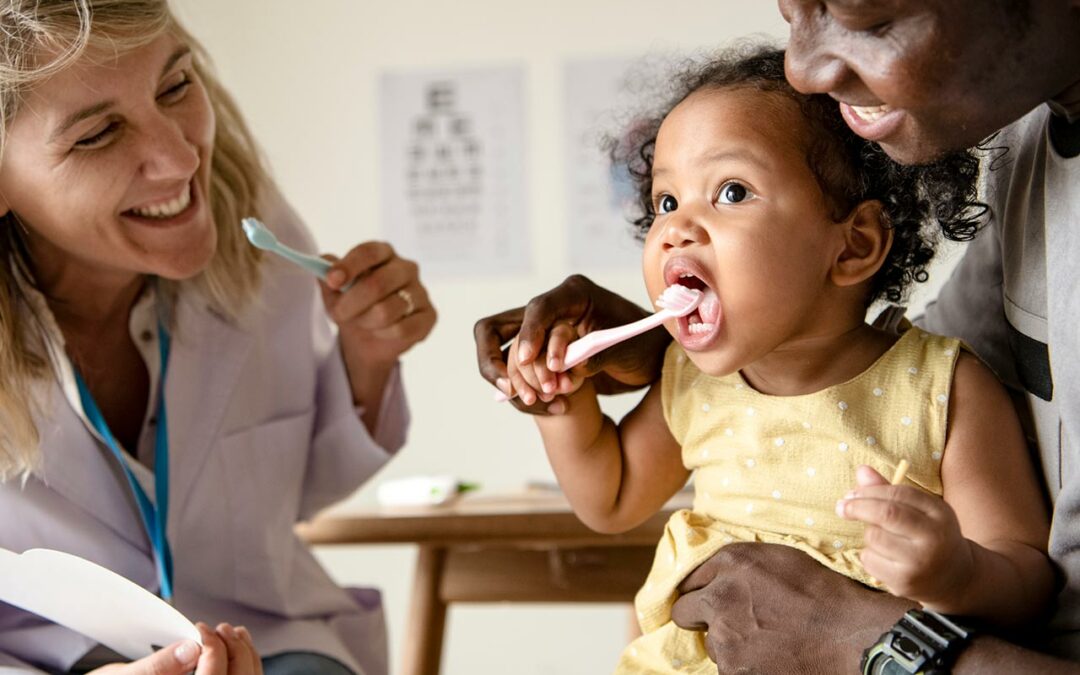For many new parents, getting familiar with all of your child’s milestones and when they’re expected to take place can be tricky. Luckily, when it comes to when your child should make their first trip to the dentist, the American Dental Association gives clear guidelines: Make your child’s first dentist appointment by your child’s first birthday or six months after their first tooth becomes visible, whichever is earliest. This may come as a surprise to most parents. According to a national poll, when parents weren’t prompted by a doctor or dentist, 83 percent didn’t take their child to a dentist until their child was more than 3 years old. However, there are numerous benefits to following the recommendation and starting these dental visits earlier.
Engrain prevention from an early age
Children present a risk for tooth decay or discoloration at their first baby tooth and a child’s teeth should be brushed as soon as they emerge. Though it is true that your child’s first set of teeth will fall out, that doesn’t make them less important. Problems that arise with baby teeth can make it difficult for adult teeth to grow or cause harm to your child’s gum and jaw.
When it comes to instilling good hygiene habits, your child’s first teeth shouldn’t be neglected. During these initial visits, you can learn how to brush your child’s teeth and gums. When your child is at least six months old, a rice-sized amount of fluoridated toothpaste is recommended as part of the cleaning, so be sure to incorporate that into your child’s morning and bedtime routine. When it comes to it, this is your child’s oral health, so make sure you’re starting good hygiene habits as early as possible.
Early exposure makes for less anxiety around dentists
It’s easy to see why you might want to put off taking your child to the dentist — chances are you don’t even like going to the dentist yourself. According to the National Institutes of Health, 36 percent of people have some sort of anxiety about going to the dentist. However, visiting a dentist early will not only help your child get a jumpstart on prevention, it also helps keep them from ever developing this anxiety in the first place.
Rest assured, these initial visits will be short, your little one can sit on your lap and there won’t be much poking or prodding. Though the dentist will do an oral exam, the experience will help your child get familiar with the dental office and let them get to know their dentist. Stickers and toys are sometimes given out as treats to act as a positive reward. All of it works together is sure to make the outing a fun one.
As a parent, you’ll learn something too
Just like a visit to your child’s pediatrician, you can walk away from your child’s first trip to the dentist with a wealth of knowledge. You can learn techniques for how to properly clean your infant’s teeth and gums and get important information on preventing tooth decay.
At the visit, you’ll be able to ask all of your nagging questions, such as does your child need fluoride? What if it appears your child is in pain from teething? And what should you do if they knock a baby tooth out? Dental professionals can also help you curb worrisome habits you might notice as a parent, such as finger sucking or pacifier habits.
How to prepare your child for the dentist
Getting your child ready for the dentist doesn’t have to be something you need to stress over. There are some simple ways to make sure this first visit goes as smoothly as possible. For example, if you’ve noticed that your child is inquisitive and that they prefer to know things ahead of time, talk to them about what the dentist does and how important it is to get these check-ups. “Your teeth have to last you your whole life,” is often a good phrase to try out. You can even show them what they can expect through children’s books or toys that replicate dentist cleaning instruments.
How your child has reacted to the doctor and in new situations and people is often a good indicator as to how they’ll react at their first dental visit. If you think your child may get upset, bring a comfort item such as a blanket, special toy or even a surprise gift. Sometimes, even the promise of a special meal or dessert will do the trick. If your child does end up throwing a fit or melting down, don’t worry — It’s nothing that an experienced dentist hasn’t seen before. Chances are, he or she has learned how to handle the situation and can accomplish the goals of the visit without making matters worse.

